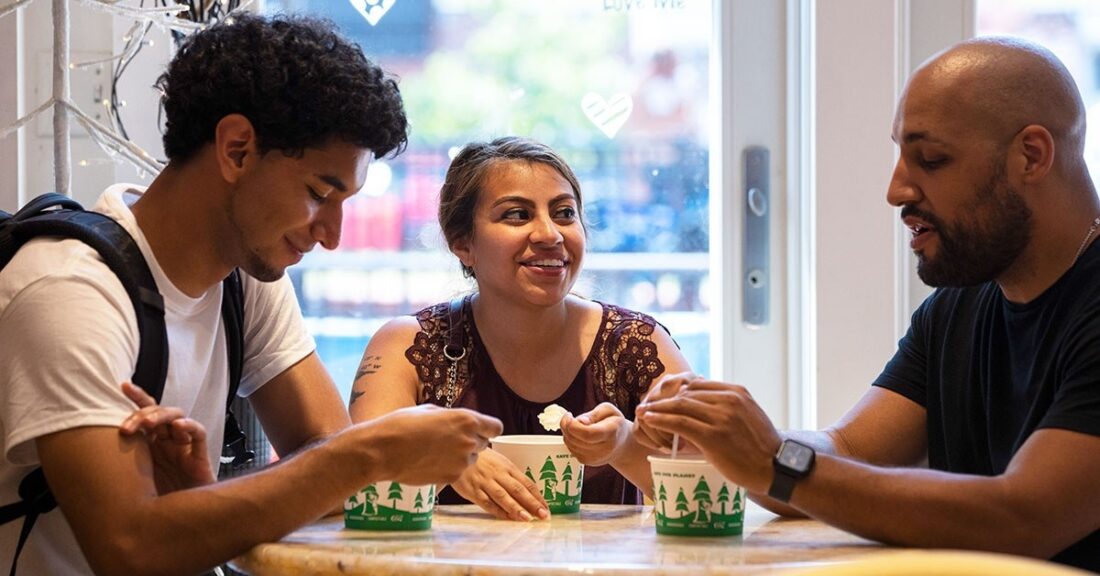Building Evidence Through Trusting Relationships Among Latino and Black Youth and Adults in Washington, D.C.

Photo credit: Wide Angle Youth Media
Can a program that builds strong community connections for young people in the short term show long-term benefits in their employment and well-being? As part of its work to build evidence of what works to help youth succeed, the Annie E. Casey Foundation has been supporting the second phase of a rigorous evaluation of Promotor Pathway®, an intensive long-term mentoring and case management program that helps youth disconnected from school and employment make a safe, healthy transition to adulthood.
Designed by the Latin American Youth Center (LAYC), a multicultural youth development nonprofit serving some 5,000 young people at sites in Washington, D.C., and nearby Maryland counties, Promotor Pathway seeks to address many of the barriers to success immigrants and low-income youth of color face — including lack of housing, substance abuse and court involvement. The ultimate aim of the program: improve education and employment outcomes, boost life skills and encourage healthy behavior.
“We focus on relationship building and youth-driven goals,” says Susana Martinez, LAYC’s chief strategy officer and national director of Promotor Pathway. “For some, it might mean going into college or vocational school. For other youth, that might mean finding stable employment, or for others that might mean becoming a strong and healthy parent to their children.”
Begin With Small Wins
Based on the conviction that a strong relationship with a caring adult is critical to a young person’s ability to achieve success, the Promotor Pathway program connects a youth advocate, called a Promotor, with a young person, ages 11 to 24, to provide long-term support, mentorship and intervention. Extensively trained by LAYC, the majority of Promotores are people of color whose experiences and communities match those of the program’s predominantly Latino and Black youth.
A central feature of Promotor Pathway is long-term engagement with young people. In most cases, the program stays connected with youths from two to four years. Sometimes, that connection can last for six years, depending upon the age a youth enters the program. Another distinguishing aspect of the program: the Promotores are available to young people around the clock for any crisis or emergency.
Based in community sites and schools, Promotor Pathway receives referrals through word of mouth within LAYC and from government agencies, schools and other nonprofits. In the first few weeks of a Promotor’s relationship with a youth, the program seeks what Martinez calls “small wins” to help establish trust. For example, a school counselor might recommend that a young mother apply for the Special Supplemental Nutrition Program for Women, Infants, and Children and the Supplemental Nutrition Assistance Program, unaware that the youth does not have the valid identification necessary for accessing these benefits. A Promotor will go with the young mom to get the ID, which opens the door for services.
Promotor Pathway was well positioned to respond to the COVID-19 pandemic, which exacerbated school, work and other challenges faced by young people of color. Like many youth-serving nonprofits, LAYC largely shifted its programming to virtual contact with clients. Promotor Pathway, however, never stopped maintaining some level of in-person contact with young people. “Promotores were able to assess needs and deliver food or diapers and even take people to doctors,” says Martinez.
Long-Term Results
An Urban Institute evaluation of Promotor Pathway, published in 2016, provided the initial evidence of the program’s positive effects on young people. Four hundred seventy-six youth, 99% of whom were people of color with an average age of 18, were randomly assigned to either a treatment group that participated in Promotor Pathway or to a control group that did not enroll the program but could still access other LAYC services.
After 18 months, youth in the treatment group were:
- 33% more likely to be engaged in school than the control group;
- 33% less likely to have a child; and
- 60% less likely to have slept in a shelter or on the streets.
Phase two of the Urban Institute’s evaluation, scheduled for release in spring 2022, will provide insights into longer-term effects of Promotor Pathway and include the results of follow-up surveys with original members of the treatment and control groups. Summarizing a recently completed analysis of the surveys, Martinez says: “We were really, really happy to see that our youth, in many cases three to four years after exiting the program, were earning much more than the control group, had more stable employment and had more stable surroundings.”
Suzanne Barnard, director of Casey’s Evidence-Based Practice Group, says the Foundation’s investment in LAYC’s evaluation work will help build the evidence base not only for Promotor Pathway but also for what it takes in general to engage and remove barriers for young people of color. “By gathering and sharing these insights, we hope to encourage more developers to design programs that succeed for young people of color because they are firmly rooted in and responsive to their backgrounds, communities and culture,” Barnard says.





